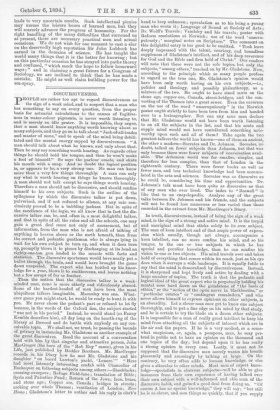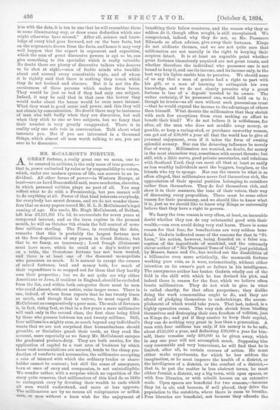DISCURSIVENESS.
PEOPLE are rather too apt to regard discursiveness as the sign of a weak mind, and to suspect that a man who has something to say on every question, from the proper basis for actuarial calculations to the causes of fugitive. ness in water-colour pigments, is never worth listening to, and is merely an idle prater. It is impossible, they argue, that a man should know anything worth knowing about so many subjects, and they go on to talk about "Jack-of-all-trades and master of none," and to speak of the mind being debili- tated and the mental energy sapped by discursiveness. "A man should talk about what he knows, and only about that. Then he may say something worth hearing. As regards other things he should hold his tongue, and then he won't make a fool of himself." So says the parlour oracle, and shuts his mouth with a snap. And no doubt the logical position is, or appears to be, a very strong one. No man can know more than a very few things thoroughly. A man can only say what is worth hearing on things he knows thoroughly. A man should not talk except he says things worth hearing.
Therefore a man should not be discursive, and should confine himself to his own subjects, Such is the outline of the syllogisms by which the discursive talker is put down, pulverised, and if not reduced to silence, at any rate con- clusively proved to be a babbling jackass. But in spite of the excellence of the login, we all know that in fact the dis- cursive talker can be, and often is, a most delightful talker, and that in spite of all the rules and all the schools, one may gain a great deal more not only of amusement, but of information, from the man who is not afraid of talking of anything in heaven above or the earth beneath, than from the correct and pedantic gentleman who is always lying in wait for his own subject to turn up, and when it does turn up, promptly blows it to pieces by discharging at its head an eighty-one-ton gun loaded to the muzzle with facts and statistics. The discursive sportsman would have neatly put a bullet through the brain, and would have brought the game down unspoiled. The expert who has bottled up his know- ledge for a year, blows it to smithereens, and leaves nothing but a few scraps of fur or feather.
Than the notion that the discursive talker is a weak- minded man, none is more utterly and ridiculously absurd. Some of the hardest-headed of men have been the most ubiquitous talkers imaginable. Macaulay was one. What- ever game you might start, he would be ready to hunt it with you. He never chose the pedant's part or refused to let fly because, in the words of the Oxford don, the subject started "was not in his period." Instead, he would stand (as Fanny Kemble describes him), all day long on the hearth-rug of the library at Bowood and do battle with anybody on any con- ceivable topic. We shall not, we trust, be passing the bounds of privacy in instancing Mr. Gladstone as another example of the great discursives. Read the account of a conversation held with him by that singular and attractive person, John MacGregor (the hero of the " Rob Roy " canoe), given in his Life, just published by Hodder Brothers. Mr. MacGregor records in his Diary how he met Mr. Gladstone and his daughter " on board Ls,wton's yacht, Lenore." " Here had most intensely interesting confab with Chancellor of Exchequer on following subjects among others :—Shoeblacks; crossing-sweepers ; Refuge Field-lane ; translation of Bible ; Syria and Palestine Fund ; Return of the Jews ; Iron, brass, and stone age ; Copper ore, Canada ; bridges in streets ; arching over whole Thames; ventilation of London ; Ecce Homo ; Gladstone's letter to author and his reply in clerk's hand to keep unknown ; speculation as to his being a young man who wrote it ; Language of Sound at Society of Arts ; Dr. Wolff's Travels ; Vambory and his travels; poster with Reform resolutions at Norwich ; use of the word unscru- pulously ; ' marginal notes on Scripture." The comment on this delightful entry is too good to be omitted. " Took leave deeply impressed with the talent, courtesy, and boundless suppleness of Gladstone's intellect, and of his deep reverence for God and the Bible and firm hold of Christ." Our readers will note that these were not the sole topics, but only the subjects, " among others," touched on by Mr. Gladstone. Now, according to the principle which so many people profess to regard as the true one, Mr. Gladstone's opinion would have been only worth having on his own subjects,—i.e., politics and theology, and possibly philanthropy, as a mixture of the two. He ought to have stood mute on the stone age, copper•ore, Canada, street-bridges, and the con- verting of the Thames into a great sewer. Even the excursus on the use of the word " unscrupulously " in the Norwich poster ought strictly to have been torn from him and handed over to a lexicographer. But can any sane man declare that Mr. Gladstone would not have been worth listening to on all the subjects in the list, and that his acute and supple mind would not have contributed something note- worthy upon each and all of them P Take again the two greatest talkers the world has known—one of them an ancient, the other a modern—Socrates and Dr. Johnson. Socrates, no doubt, talked on fewer subjects than Johnson, but that was only because there wore fewer subjects of conversation avail- able. The Athenian world was far smaller, simpler, and therefore far less complex, than that of London in the eighteenth century. There were fewer books as well as fewer men, and less technical knowledge had been accumu- lated in the arts and sciences. Socrates was as discursive as he could be, considering his time and opportunities. Dr. Johnson's talk must have been quite as discursive as that of any man who ever lived. The index to " Boswell " is like that to an encyclopedia. Analyse any of the great talks between Dr. Johnson and his friends, and the subjects will not be found leas numerous or less varied than those recorded in the extract from Mr. MacGregor's Diary.
In truth, discursiveness, instead of being the sign of a weak mind, is the sign of a strong and active mind. It is the torpid and unoriginal mind that sticks solely to its own subject. The man of keen intellect and of that ample power of expres- sion which usually, though not always, accompanies a keen intellect, can no more confine his mind, and so his tongue, to the one or two subjects in which he has special and peculiar knowledge, than he can confine his vision to one or two objects. His mind travels over and takes hold of everything that comes within its reach, just as his eye does when it surveys a wide landscape. It is equally futile to say that the mind is demoralised by discursiveness. Instead, it is sharpened and kept lively and active by dealing with a large number of topics. The truth is that the pedantic and logical ideal of the great expert who is perpetually holding his mental nose hard down on the grindstone of "the basis of ethics," or the "action of the optic nerve in blackbeetles," or "particular estates " or " contingent remainders," and who never allows himself to express opinions on other subjects, is an absurdity. Let a clever man once get to know one subject thoroughly, and to put a fine edge on his mind by that study, and he is certain to try the blade on a dozen other subjects. It is impossible for a man of really great intellect to keep his mind from attacking all the subjects of interest which are in the air and the papers. If he is a very modest, or a some- what suspicious, or, again, a pompous, man, he may pre- tend in public not to have an opinion on the thousand and one topics of the day ; but depend upon it he has really a strong opinion in every case. Lastly, it must not be supposed that the discursive man merely wastes his breath pleasantly and amusingly by talking at large. On the contrary, he very often adds to human knowledge, or else gives a stimulus to other minds. Most men of expert know- ledge—specialists in abstruse subjects—will be able to give instances from their own experience of having talked over their own subject with a well-informed and able man of the discursive habit, and gained a good deal from doing so. " Of course A has no special knowledge," they will say ; "but still he is so clever, and sees things so quickly, that if you supply him with the data, it is ten to one that he will recombine them in some illuminating way, or draw some deduction which one might otherwise have missed." After all, science and know- ledge of every kind goes forward, not on the bare facts, but on the arguments drawn from the facts, and hence it may very well happen that the expert in argument and exposition, which the man of great discursive powers is apt to be, can give something to the specialist which is really valuable. No doubt there are plenty of discursive talkers who deserve to be shot at sight,—men of feeble minds who twaddle about and around every conceivable topic, and of whom it is rightly said that there is nothing they touch which they do not becloud and obscure. But it is not the dis- cursiveness of these persons which makes them bores. They would be just as bad if they had only one subject. Indeed, it may be said that in that case the horror they would make about the house would be even more intense. What they want is good sense and power, and this they will not obtain by concentration. No doubt there may be instances of men who talk badly when they are discursive, but well when they stick to one or two subjects, but we fancy that their number is very greatly exaggerated. There is in reality only one safe rule in conversation. Talk about what interests you. But if you are interested in a thousand things, which almost all men worth talking to are, you are sure to be discursive.







































 Previous page
Previous page